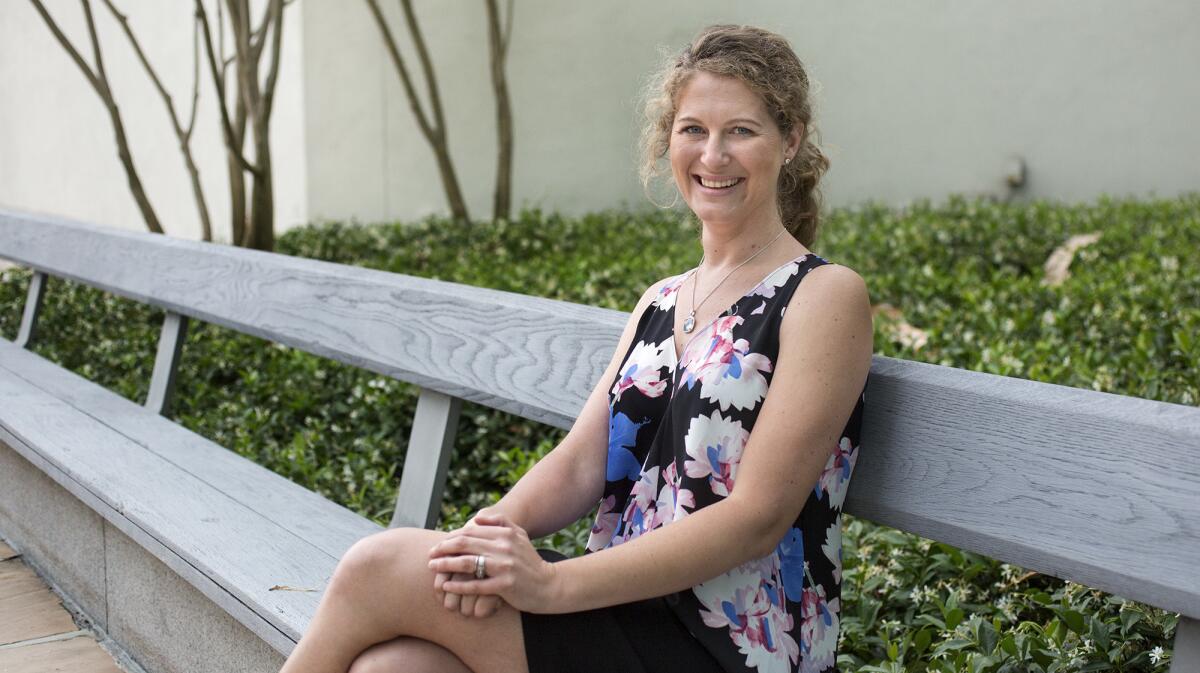Hospice worker, a two-time stroke survivor, is honored for her work

- Share via
Michelle Wulfestieg had long felt empathy toward the disabled and dying. A devastating stroke when she was a child limited her body and shortened her life expectancy.
Knowing life was fleeting and illness and hospitals painful and stressful, she chose to live fully, traveling the world, playing sports — she served a volleyball one-handed — and volunteering with hospice patients.
Now, as executive director of the Southern California Hospice Foundation in Costa Mesa, she helps people with months to live with practical needs such as groceries and utility bills, family reunions and fulfilling wishes for children and adults, such as helping them meet celebrities and athletes.
That service has been honored with Fairhaven Memorial Park & Mortuary’s Oliver Halsell Care Award, which recognizes end-of-life caregivers.
Wulfestieg was recovering from her second stroke, this time as an adult, when she felt her purpose as a hospice professional crystallize.
“I think all of us have a life’s purpose. All of us are here for a reason,” she said. “When we find our purpose, things fall into place.”
Rod Gomez, general manager of Fairhaven Memorial Park in Santa Ana, said Wulfestieg goes above and beyond. She has done great things with wish fulfillment — her office walls are lined with photos of patients with notables such as Oprah Winfrey, Selena Gomez and members of the Angels baseball team — and her values align with the cemetery’s in care during difficult times, Gomez said.
“She’s exemplary,” he said.
Wulfestieg, now 35 and living in Newport Beach, was a typical girl until she had her first stroke at age 11. That’s when she learned she had an arteriovenous malformation, a congenital defect that tangled blood vessels in her brain into a knot. When blood pressure gets too high, the vessels burst, causing a hemorrhagic stroke.
Most malformations of that type are the size of a dime or quarter. Hers was the size of a breakfast sausage. It plunged vertically inside her brain, crossing the areas that control motor skills, vision and language.
Doctors thought it was too deep to be operable. She had two radiation treatments, the first of which caused partial paralysis on her right side and forced her to relearn basic tasks with her left hand.
The third and final treatment would pose great risk to her ability to speak or understand language. When she was 14, doctors told her that leaving the area untreated would mean a second stroke and she would be dead by 30. She declined the treatment.
She was 25 when the next stroke came. She was printing her thesis for her master’s degree in organizational leadership from Chapman University when she fell ill.
She arrived at Hoag Hospital in Newport Beach in a low coma and doctors were ready to harvest her organs. Her best friend wrote a eulogy. Doctors said that if they didn’t operate, she would die that night. If they did, she had a 50-50 chance of survival.
Even after the six-hour surgery, they weren’t sure whether she would walk, talk or see again.
Wulfestieg was in a coma for eight days and remembers being able to hear her husband, Steven, telling her to open her eyes. She said she was in a beautiful and welcoming place but came back after a voice told her to. A Christian woman, she said that voice was God’s.
The surgery removed the remains of the lesion, giving her a normal life expectancy. But her physical disabilities remain. Her 5-year-old daughter, Bailey, is literally her right hand. But she said doctors have told her she’s a walking miracle.
Wulfestieg wrote an autobiography, typed with one hand, and volunteers at her church’s Sunday school and in her daughter’s kindergarten class.
She focuses on her patients but will share her background if she feels they or their families are struggling. Based on vivid memories from her coma, she tells families that their loved ones can hear and that they can comfort them and tell them they love them.
“Death is not something to be feared,” she said. “I wasn’t in any pain, I wasn’t scared. I could have gone the other way just fine.”
But she returned and is serving her purpose.
Twitter: @Daily_PilotHD
All the latest on Orange County from Orange County.
Get our free TimesOC newsletter.
You may occasionally receive promotional content from the Daily Pilot.







